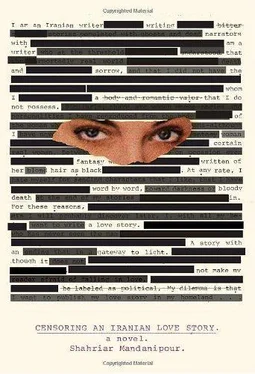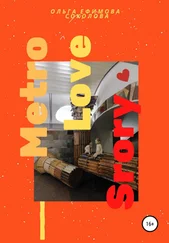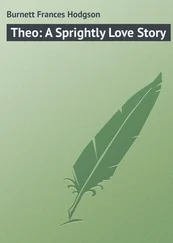Shahriar Mandanipour
Censoring an Iranian Love Story
TO ROBERT COOVER, KAREN KENNERLY,
SARA KHALILI, JAMES KIMMEL, AND JANE UNRUE,
WITHOUT WHOSE FAITH AND FELLOWSHIP
WRITING THIS NOVEL WOULD NOT HAVE BEEN POSSIBLE
The tale of he who a treasure map found that out some gate should you take leave, there sits a dome, if your back to the dome you turn and your face fronting Mecca, and an arrow you sling, whither the arrow falls a treasure trove lies. He went and arrows he let fly, so much so that he despaired, he did not find. And this news reached the King. Long-range archers arrows let fly, indeed naught was found. When to his Holiness he appealed, unto him it was inspired that we did not bid to pull the bow-string. Arrow in the bow he set, there before him it fell.
SHAMS TABRIZI (D. 1248)
DEATH TO DICTATORSHIP, DEATH TO FREEDOM
In the air of Tehran, the scent of spring blossoms, carbon monoxide, and the perfumes and poisons of the tales of One Thousand and One Nights sway on top of each other, they whisper together. The city drifts in time.
In front of the main entrance of Tehran University, on Liberty Street, a crowd of students is gathered in political protest. With their fists raised they shout, “Death to captivity!” Across the street, members of the Party of God, with clenched fists and perhaps chains and brass knuckles in their pockets, shout “Death to the Liberal …”
The antiriot police, armed with the most sophisticated paraphernalia, including stun batons purchased from the West, stand facing the students. Both groups try, before they come to blows, to triumph over their opponents by shouting even louder. Drops of sweat ooze from faces and specks of spit spew from mouths. Fists, before pounding on heads, rise without miracle toward the sky.
It is perhaps because of these fists that from the sacred sky of Iran no miracle ever descends. Since one hundred and one years ago — when the first revolution for democracy triumphed in Iran — fists similar to these have risen toward the sky of a country with the greatest number of holy men, with the most prayers, tears, and religious lamentations; and today, I believe, the greatest pleas to God for speeding up the day of resurrection rise from Iran.
A short distance away, on the sidewalk, with her back to the steel fence lodged in the three-foot-tall stone wall surrounding Tehran University, stands a girl who, unlike most girls in the world but like most girls in Iran, is wearing a black headscarf and a long black coat as a coverall. She possesses a beauty common to all girls in love stories, a beauty that many girls around the world, and in Iran, who read these stories want to possess. If the ghosts of the thousands of poets who died a thousand years ago, seven hundred years ago, or four hundred years ago, and the spirit of those yet to be born — who, unlike the living, in the democracy of death amicably and tolerantly wander the streets of Tehran — see her large black eyes, they will liken them, as is customary of their poetry, to the sad eyes of a gazelle. An old simile for a pair of Oriental eyes that stole Lord Byron’s heart, and Arthur Rimbaud’s, too … But contrary to this clichéd simile, there is a mysterious look in this girl’s eyes. It is as if they possess the power to traverse time, the power to pass through the golden walls of harems or perhaps the firewalls of Web sites and Internet filters.
But the girl does not know that in precisely seven minutes and seven seconds, at the height of the clash between the students, the police, and the members of the Party of God, in the chaos of attacks and escapes, she will be knocked into with great force, she will fall back, her head will hit against a cement edge, and her sad Oriental eyes will forever close …
The girl attracts the attention of mysterious people who during political demonstrations in Iran monitor the scene from discreet corners and identify people. They point her out to one another. One of them, from a very professional angle, takes a photograph and films her.
I know this girl is not a member of any political party, but she is timidly holding a sign that reads:
DEATH TO FREEDOM, DEATH TO CAPTIVITY
It is a strange slogan that I don’t believe has ever been seen or heard under the rule of any dictatorial, Communist, populist, or even so-called liberal regime. And I don’t believe it will ever be heard under the rule of any future regimes that for now remain nameless.
When they pause to catch their breath in between shouting their slogans, the students seeking freedom and democracy point to the girl and her sign and ask, “Who in the world is she? What is she trying to say?”
The more experienced students, old hands at political protests, respond:
“Completely ignore her. She’s an infiltrator. The Party of God has paid her to create distrust and division among us. To defuse the conspiracy, just act as though she doesn’t exist.”
On the opposite side, the fanatic members of the Party of God also point to the girl and ask, “What’s that prissy girl trying to say over there?”
They hear from their leaders:
“The lewd hussy is one of those Communists who have recently come back to life. Their Big Brother in Russia is gaining strength again … but the pathetic slobs only have a handful of members in their party. This is how they hope to attract attention … Just ignore her. Act as though she doesn’t exist.”
With their wireless radios, the secret police pass along the girl’s location and ask, “What does this mean? We have no instructions for such cases. What should we do with her?” And they receive instructions:
“Watch her with extreme vigilance and caution. This is most definitely a new conspiracy and a new plot for a velvet revolution orchestrated by American imperialism … Keep her under surveillance but do not let her suspect anything. Let her think she doesn’t exist.”
Nameless shades of rage and hatred, voiceless cries of blood and hope and darkness, hang in the air. From one direction, meaning Anatole France Avenue, and from the other direction, meaning Revolution Circle, the police have blocked all car and pedestrian traffic to this section of Liberty Street. In Revolution Circle, hundreds of cars are logjammed, anxious and overwrought drivers blow their horns, and amid the cars curious people stand peering toward Tehran University. It was right here that more than a quarter century ago, on a cloudy winter day, the people of Tehran for the last time dragged down the metal statue of the Shah sitting astride a horse. Of course in those days, when it came to dragging down metal statues of dictators, American tanks sided with the world’s dictators.
The student protesters, aware that they are about to be attacked, break into a heartrending anthem: My fellow schoolmate,
you are with me and beside me,
… you are my tear and my sigh,
… the scars of the lashes of tyranny rest on our bodies,
our uncultured wasteland, all its wild plants weeds,
be it good, be it bad,
dead are the souls of its people,
our hands must tear down these curtains,
who other than you and I can cure our pain …
In the lyrics and melody of this anthem lies an age-old Iranian sorrow that brings tears to the girl’s eyes … She raises her sign even higher. From behind the veil of her tears, the world is transformed into undulating buildings, severed shadows, and rippling reflections on water … The young girl’s isolation and her fear of strangers heighten. She looks up to find some solace in the blue of the sky. She sees a winged horse that like a white cloud, ignoring the people below, flies by. Terrified, she sees flames rising from the horse’s back. The blazing horse disappears behind a high-rise. The girl waits, but the horse does not reappear …
Читать дальше












